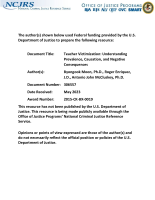Frequency of Nonnarcotic Drug Use and Its Relationship to Criminal Activity Among Narcotic Addicts
Date Published
November 2025
Agencies
NIJ-Sponsored
Publication Type
Research (Applied/Empirical)



